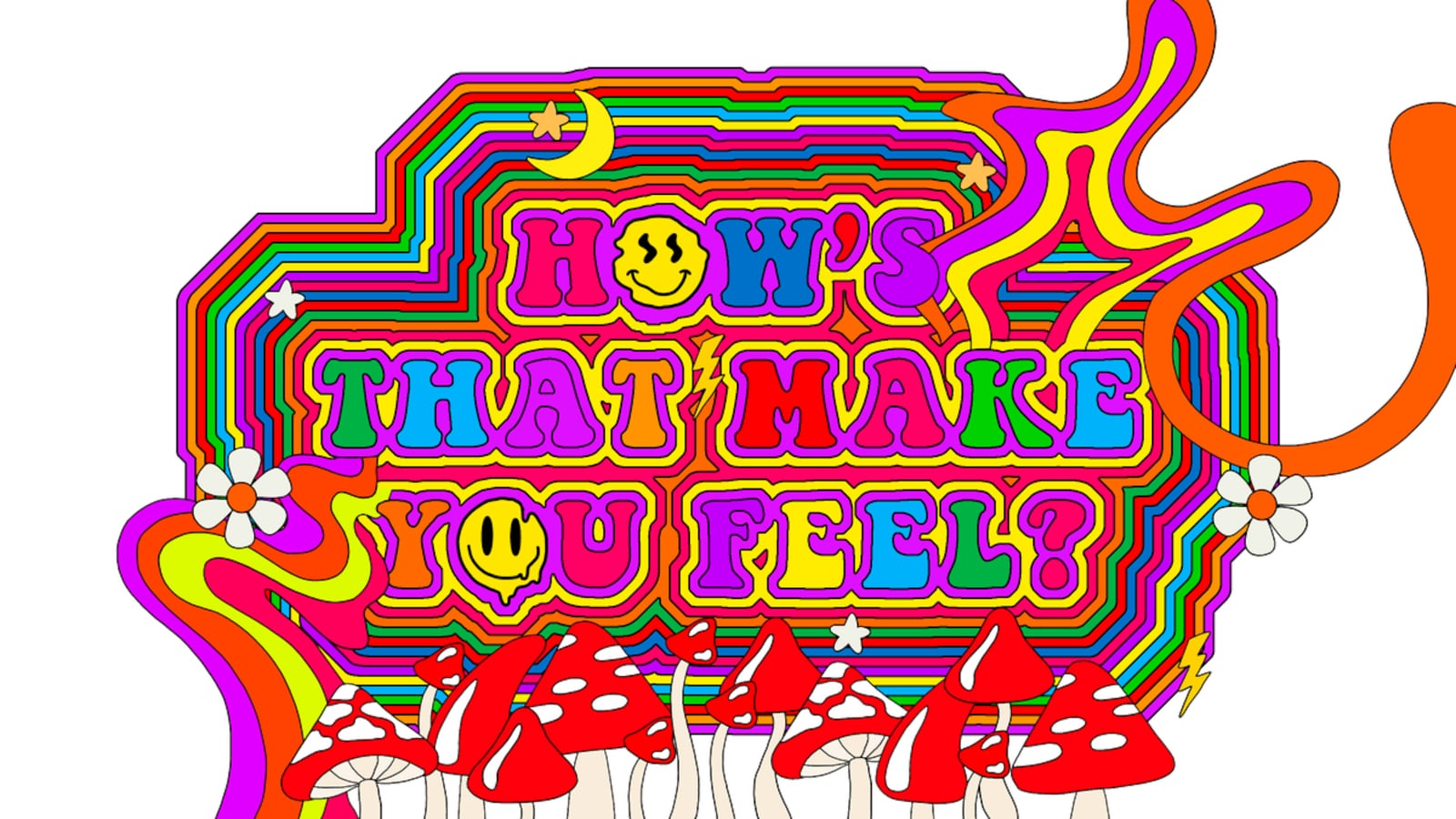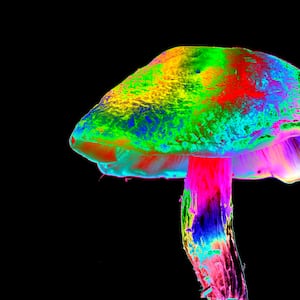Laying in a bed in Bellevue Hospital with a blindfold over her eyes, Bronya saw the dragon.
As her body metabolized the psilocybin, a hallucinogenic mushroom extract, the 55-year-old home health aide then somehow was inside the beast, resting in its belly like a baby in the womb as it flew over mountains.
They arrived at what Bronya can only remember as a vast “fleshy thing, it was like flabs of pinkish tissue.” She pushed herself through. It enveloped her and she found herself in a dark cavern. There she saw a batch of glistening eggs. She was encased in a womb for the second time during the trip. It was a reverse birth. One of the eggs transmitted a message to her: The egg was her, from another time and dimension, and she wanted to be born.
The vision contrasted with a notion she carried for decades. “I often thought it would be better if I had been never born,” said Bronya (a pseudonym). She grew up in Eastern Europe with cold and distant parents. She emigrated to New York City for a job as a translator. The job ended. The city was a lonely place. Her depression caused brain fog, sapped her of desire or ambition and stoked self-loathing. She used alcohol to get by, sipping down half a bottle worth of wine throughout a day.
Bronya was fortunate to find a research study, the only legal way to access psilocybin therapy programs in the U.S. For everyone else who might be entertaining the notion of using “trip” drugs as psychotherapy—newly popular thanks to Michael Pollen’s Netflix docuseries and a bevy of new scientific research—there is another option: a growing network of “psychedelic support” therapists working in a legal grey area.
They won’t help you obtain illegal drugs. Or most won’t. What they can do is speak to the research-backed reasons to try various substances. Psilocybin may alleviate depression symptoms while MDMA has shown results for post-traumatic stress disorder. They will help you prepare for your experience and decode it afterwards. They mostly don’t take insurance.
They are accredited, degree-holding licensed clinical social workers. Some also cut their teeth working the “trip tents” of music festivals or through self-experimentation. Some took psychedelic therapy courses at organizations like the California Institute of Integral Studies or Naropa University—both small four-year colleges with a grounding in Eastern philosophy—or with the mother of all mind expansion research organizations, the Multidisciplinary Association for Psychedelic Studies (MAPS).
As psychedelics go mainstream, they’re filling a role once occupied by underground trip-sitters and ayahuasca-serving shamans. Researchers increasingly think that psychedelics (a category expanded in this context to include empathogens, like MDMA) cause a rewiring of neuronal circuits, allowing a person to overcome a state of immobility to their condition.
Bronya felt emotionally lighter after her first trip, which was three years ago. “I was stuck in such a stupid place,” she said. “I just blamed myself for being a failure. I just have more compassion for myself [now].”
But she also felt off-balance. “I couldn’t make decisions,” she said “I just had all these thoughts on politics and music and art I couldn’t sort out.”
She started having anxiety attacks. “It was like someone gave me a software update and I did not know how to use the software.”
She had some follow-up sessions with the New York University therapists running the trial, but it wasn’t enough. So she found two sources for help: a supplier of psilocybin for micro-dosing and a therapist familiar with psychedelics, who charges $300 out-of-pocket for Zoom sessions.
The legion of psychedelic support therapists is growing. An online directory, the Psychedelic Support Network, reached 1,200 health-care providers listed this month, according the site’s founder. A year ago, it had 492.
In its five years of existence, the California Institute of Integral Studies has graduated 549 therapists from its psychedelic therapy training certificate program. Naropa University started a similar program last year with 108 participants. A spokesperson for MAPS said that 1,800 therapists have completed their training program.
Chris Hancock, a psychedelic support therapist in a suburb of Nashville, did his share of mind-altering substances as a second-wave Deadhead in the 1980s. Armed with a psychology degree, he now consults about trip drugs for therapy. Most clients see him via tele-therapy. He has a white stubble beard and intense green-eyed gaze. Picasso’s portrait of an old man hunched over a guitar is in the background.
“I would be connecting your hope and your desire for how it can be a facilitator for change, growth, healing and consciousness expansion to the particular substance you might feel drawn to,” he explained.
Agenda items include “setting intentions, talking about the paradox of having an intention plus intending to surrender, and remembering to surrender during the process.”
People commonly see him for PTSD or depression. Drugs of choice include psilocybin and ketamine, the latter of which is legal; a prescription nasal spray is FDA-approved for “treatment-resistant” depression.
As far as where clients got the drugs, “I'm not as interested in that,” Hancock said. “Everyone has can make their own sovereign choice about how they go about that.” Some of his clients grow mushrooms at home.
His psychedelics sessions cost $160 an hour, the same as any out-of-pocket session.
Part of a psychedelic support therapist’s role is just advising on practical considerations for people who don’t trip recreationally.
Brian Pilecki of Portland has a checklist: Prepare a safe room. Enlist a trusted friend or friends to stay over. Consider the next day’s schedule. Maybe take work off. “A lot of these sorts of details people who are brand new to it don’t think about,” said Pilecki. “They don’t think about how to plan for meals. All of these things can have an influence on the experience.”
Established psychedelic support therapists could be in a fortuitous position if and when the therapy gets full government backing.
Considering the persuasiveness of the last 15 years of clinical research, many medical professionals, including some within Biden’s administration, think that the Food and Drug Administration will authorize MDMA for PTSD and psilocybin for depression within two years. Oregon has lifted prohibitions against medicinal psilocybin, effective in 2023. Some biotech companies are already courting investors with patents for psychedelic-derived medicines.
As of now, psychedelic support therapists, with the exception of some who work with ketamine clinics, face the dilemma of not being able to deliver the complete package. The client has to score their own drugs.
For fear of losing their licenses, many above-board therapists are clear to patients that they will do nothing to help them find drugs. This is Pilecki’s policy. “I don't like to do anything illegal,” he said. “Basically, I provide therapeutic services to clients who are using psychedelics on their own.”
If you ask almost any psychedelic support therapist, they will admit to knowing—even respecting—some people who work “underground” (though they do fear the lack of accountability).
“An underground guy is somebody who charges a fee for facilitating a psychedelic experience,” said Pilecki, “and some of them are therapists or have a therapist training. Some of them are more religious, or they, you know, identify as a shaman or something. But they basically provide these experiences for people. It is illegal.”
In Portland, however, psychedelics are so decriminalized that underground guides have handed him business cards. Pilecki won’t pass them on to a client. But some of his colleagues will.
“There are some therapists who will consult with underground guides or refer their clients to underground guides, and sort of work with them,” he said. “So there's sort of a range and there's obviously more risk.”
Chris LaManna, a svelte, fiery-bearded yoga instructor and psychedelic guide living near Detroit, is the underground counterpart for trip therapy. He runs a one-man alternative health business called AHA Wellness.
LaManna graduated from Central Michigan University in 2013 with a BA in business administration—as well as two felony convictions for selling psilocybin. “That freed me to go an alternative route in life,” he said. “I can’t get jobs in corporate America. It pitted me against the system. That led me to travel, to teach yoga. It was a blessing in disguise.”
He spent time in Peru learning to work with ayahuasca and then Ecuador training with huachuma, a hallucinogen from the San Pedro cactus, at retreat centers run by Indigenous peoples. When he and his wife returned to Michigan, Ann Arbor and Detroit decriminalized psychedelic plants.
LaManna talks like a therapist. “[I’m] putting together programs like these for people, so that they can make lasting change, that the psychedelics can allow a reset to give you some space to make changes,” he said. He incorporates coaching, yoga and exercise into the regiments for clients. He tries to work with people for six months. He charges $3,000 for that kind of psychedelic overhaul.
Where LaManna differs from a licensed clinical social worker in the psychedelic space is that if you ask him for a hookup to a drug supplier, he’ll gladly give you one.
“Yeah, I can point them in the right direction,” he said. “I know people who grow mushrooms, for instance, that live in Detroit and Ann Arbor so. So yeah, it's not too difficult to get your hands on at least the plant medicines.” He isn’t worried about legal trouble. “I think the police have bigger fish to fry.”
LaManna is less excited about the legitimization of the field, not just because it could put him out of work, he says. For him, psychedelics are spiritual. He doesn’t want to see them “turned into another commodity.”
“I’m so surprised about the psychiatrists and psychologists where it's just a job for them,” said LaMann “and they’re not continuing to do their own work.” By that, he means tripping themselves.
“You know, you can't take anybody further than you've gone.”






